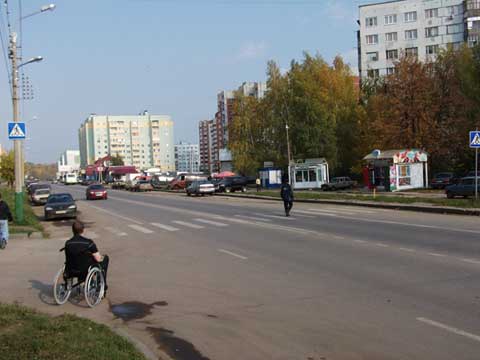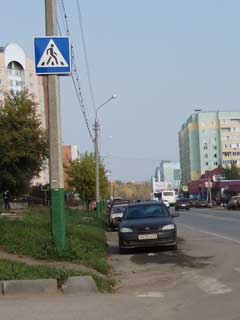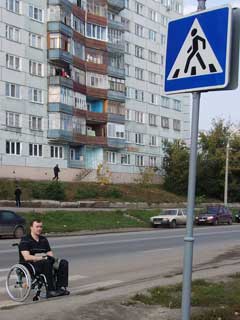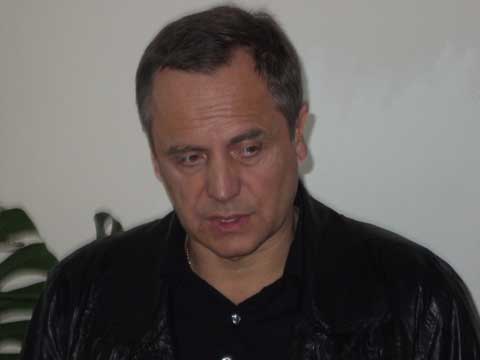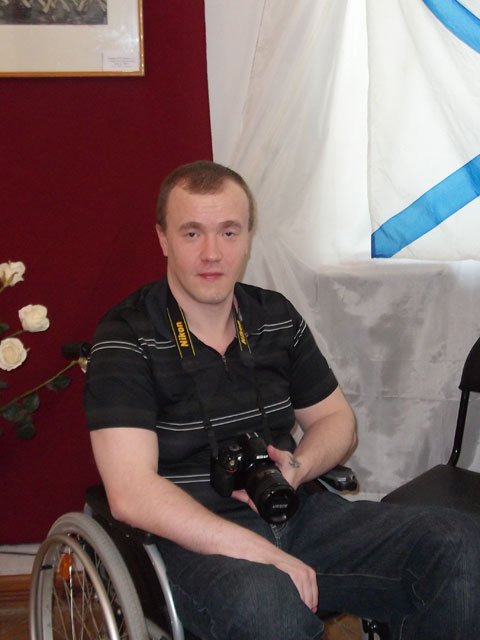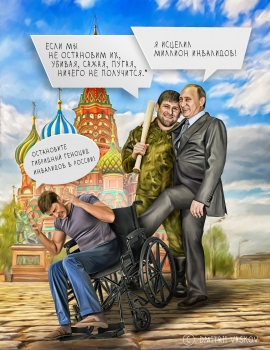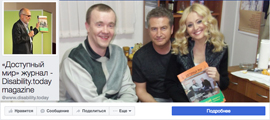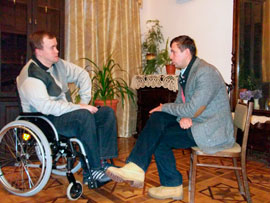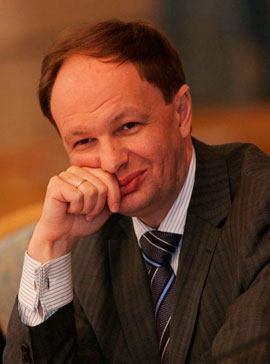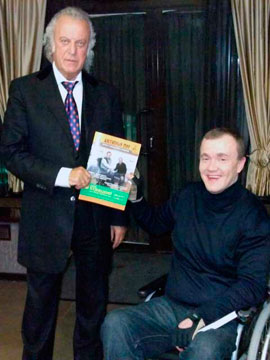Ольга Кормухина: Для меня люди с ограниченными возможностями здоровья это духовные исполины, каждый день совершающие подвиг
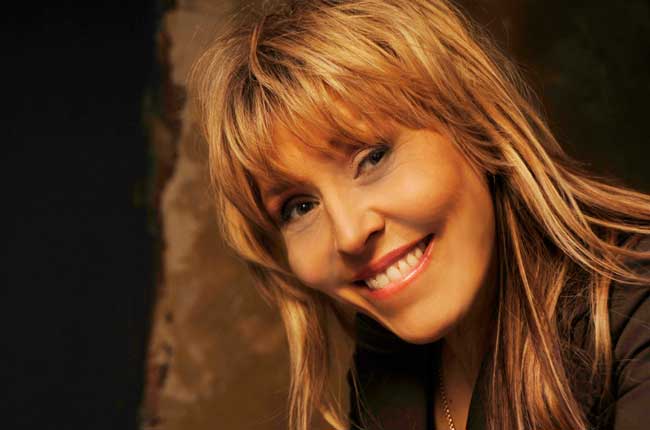
Лет 15 назад, когда поиски истины и духовного учителя привели меня на остров Залита к святому старцу отцу Николаю Гурьянову, которого знают и чтят православные (да и не только православные) люди во всем мире. Историю нашего знакомства и "брака по благословению " батюшки Николая сняли и показали практически все телеканалы России и не только. Любят люди сказки со счастливым концом. И, наверное, это правильно.
Так вот. В одну из первых поездок к батюшке я, как и многие другие паломники, из разных мест приехавших к отцу Николаю, кто с целью получить ответы на самые важные вопросы, кто в надежде исцелиться от своих недугов, кто за молитвенной помощью или решением проблем, с мирской обычной точки зрения-неразрешимых, но, по молитвам святого старца, устраивавшихся самым лучшим образом, стала свидетелем замечательной встречи. Именно встречи. И вы поймете, почему. Но все по порядку. Погожий осенний денек. Возле домика старца, как всегда, толпится народ. Лица в напряженном размышлении, ожидании чего-то очень-очень важного. Только дети радостно снуют, как воробышки, между взрослых, стоящих маленькими группками. О!Эта святая беззаботность детской души, еще не омраченной грехами и страстишками, сомнениями и маловерием! Все ждут, когда из кельи выйдет батюшка! И вот радостный шепот волной прокатился от тех, кто стоит у самых дверей домика до самых крайних "батюшкиных гостей": "Вышел,вышел.. Сейчас будет принимать..." Да, про старцев так и говорят, как про врачей: Вас старец принял? Или: А старец будет сегодня принимать? Потому что к ним, как к врачам, со всех концов земли,тянутся вереницы людей всех сословий и возрастов за исцелением от недугов духовных и телесных.
Все оживились, улыбки появились на лицах даже тех, кто стоял до этого с понурым видом, что-то детское стало проглядываться в их выражении. Толпа заметно сгруппировалась и подалась вперед, ближе к дому. В конце людского потока мелькнула батюшкина скуфейка (островерхая шапочка). В сердце что-радостно и тревожно толкнулось и замерло в ожидании очередного чуда (каждая встреча с отцом Николаем была чудом и не только для меня!). Я стала пробираться поближе, но не распихивая никого, а как будто кто-то меня вел через толпу, и , когда я была уже в двух шагах от батюшки, вдруг заметила, что он смотрит как бы через меня на кого-то и говорит: "Иди, иди ко мне!" Оглядываюсь... И тут прямо передо мной пожилая женщина выкатывает инвалидную коляску, а в ней- молодой человек лет 25-28-ми, так мне показалось.
Батюшка вышел из сеней (а обычно он принимал всех, не переступая порога кельи, дверной проем был как бы границей между суетным и грешным миром," пришельцами" из которого были мы и Миром Горним, где старец творил свои святые молитвы за этот самый грешный мир земной и за тех, кто не только не чувствовал этих молитв, но и о старце не знал и не догадывался даже).
Мы все расступились невольно, потому что чувствовалось что-то очень значительное во всем, что происходило. Нет, это не была жалость человека к человеку искалеченному, это была встреча двух людей, с верой и готовностью несущих свой крест за грехи этого мира. Ведь если кто-то не хочет даже задумываться о смысле человеческой жизни, не то, что крест свой с достоинством нести, но еще и ропщет, что ему не дают вволю насытиться земными "благами" или кто-то до такой степени ими пресыщен, что и забыл давно о своем человеческом достоинстве, значит кому-то придется понести вдвойне или втройне.
Я все время об этом думаю и на всех людей, кто несет нелегкий крест недуга, смотрю,как на Атлантов, держащих небо (да простят мне это сравнение), небо, которое уже давно могло бы обрушить на нас кару за то, что весь мир сошел с ума и люди уже не просто не братья в большинстве, а как противники друг другу. И только молитвенники да страдальцы еще удерживают милость Божию на нас да Его Божественная любовь. Завидно мне даже стало тогда, да и не только мне, наверное. Никогда больше не видела я, чтобы старец так на кого-нибудь смотрел. И сказал:" Миленький! Потерпи! Все хорошо будет!" (ведь здесь на земле мы только учимся жить, готовимся к вечности, а там - уже все, кто чему научился, то и получит.
Научился прощать и любить не смотря ни на что, вот тебе прощение грехов и Божественная Вечная Любовь!) паренек просиял весь и говорит: "Батюшка! Я учиться хочу! В политехнический. Благословите?" А старец с улыбкой: "учись, учись, сынок! Ученье-свет! Закон Гука помнишь? Сила противодействия прямо пропорциональна силе воздействия. Понял? Бог благословит. В политехнический." И мы все, кто стоял рядом и слышал слова старца, поняли, что это не только к нему относится, но и к нам всем. Это о том, что надо сопротивляться злу, как только можешь и своим страстям тоже.
И еще все почувствовали, что этот парень выше нас, и это мы - нравственные калеки, которые приехали чего- то себе выпросить, какой-то помощи от старца, а человек "с ограниченными возможностями" (как говорят в миру), приехал за благословением и институт. Вот так! Не знаю, ответила ли я на вопросы вашего журнала, но думаю, что мнение одного великого старца намного дороже того, что говорит и тем более думает весь мир, уже давно сошедший с ума. Для меня эти люди-не инвалиды, а духовные исполины, каждый день совершающие подвиг. Низкий вам поклон, родные мои!
